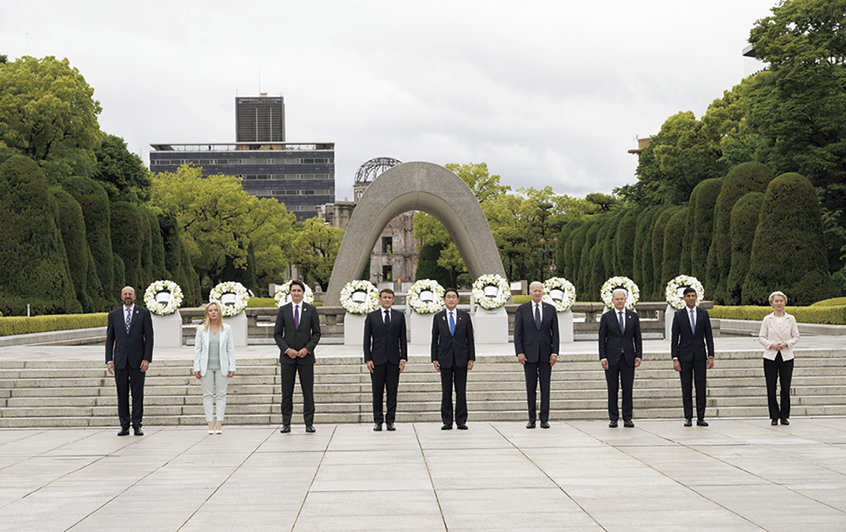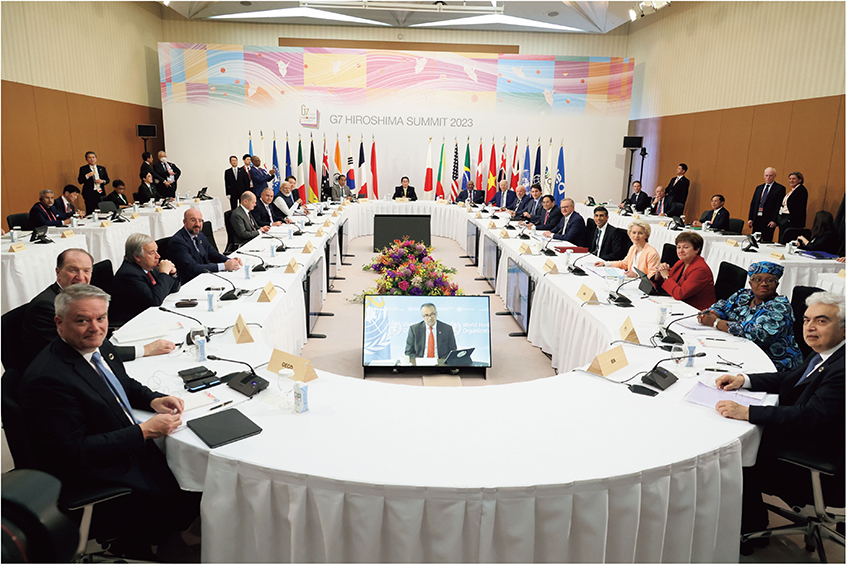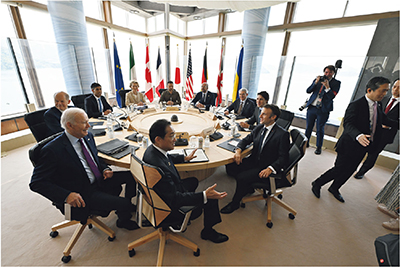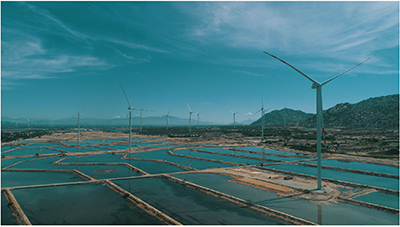2 G7 Hiroshima Summit - Discussions and Outcomes in the Field of Development

Prime Minister Kishida and other G7 leaders laid a wreath at the Cenotaph for the Atomic Bomb Victims and offered a silent prayer.
In May 2023, the G7 Hiroshima Summit was held under Japan’s Presidency. At the summit, Japan emphasized two perspectives in order to create an international community characterized by cooperation, not division and confrontation. The first is upholding the free and open international order based on the rule of law, and the second is strengthening outreach with international partners beyond the G7.
Regarding the second perspective, in particular, as the presence of emerging and developing countries called the “Global South” has increased, Japan considers that various issues facing the international society, including food, development, health, climate change and energy, and the environment, cannot be solved by the G7 alone. Therefore, Japan emphasized the significance of strengthening engagement with international partners, including countries called the Global South, and held discussions on these issues at the summit inviting eight countriesNote 3 and seven international organizations.Note 4
Prime Minister Kishida pointed out the marked increase in the estimated Sustainable Development Goal (SDG) financing gap while the year 2023 marks the midpoint toward achieving the SDGs. He further stated that, to make steady progress for the achievement of the SDGs, Japan would advance its efforts toward the effective use of development cooperation and the mobilization of private capital, emphasizing Japan’s stance of focusing its efforts to support vulnerable people based on the concept of human security in the new era. Furthermore, Prime Minister Kishida stated that the G7 launched the Partnership for Global Infrastructure and Investment (PGII) in 2022 to close the global infrastructure investment gap and would mobilize up to 600 billion US dollars in public and private finance by 2027, reaffirming the G7’s continued and strong commitment to this initiative. Regarding the Multilateral Development Banks (MDBs) reform, Prime Minister Kishida stated that it is necessary to strengthen responses to global issues while maintaining traditional development goals such as poverty reduction. In addition, he called on all creditor and debtor countries to comply with international rules and standards and to promote transparent and fair development finance. Moreover, Prime Minister Kishida explained that Japan would provide over 1.7 billion US dollars in humanitarian assistance in 2023 to address the worsening humanitarian crisis, and the G7’s commitment to provide more than 21 billion US dollars in humanitarian assistance.
In December, the G7 Leaders’ video conference was held as a wrap-up of the G7 Japanese Presidency. The G7 Leaders’ Statement issued after the meeting outlined the follow-up of the outcomes of the G7 Hiroshima Summit, including in the field of development.
■ Issues by Field

Prime Minister Kishida chairing Session 6 “Working Together to Address Multiple Crises”
(Food)
With regard to food, the participating countries and organizations shared the view that it is of urgent importance to respond to immediate food crisis and establish resilient food security, amid the rapid deterioration of global food security since 2022, especially in developing countries, and the growing sense of crisis about the vulnerability of food systems. In line with these discussions, the leaders of the G7 and invited countries jointly issued the “Hiroshima Action Statement for Resilient Global Food Security”Note 5 and agreed to take concrete actions and work together to respond to the global food crisis and build resilient, sustainable, and inclusive agriculture and food systems.
(Health)
Regarding health, the participating countries and organizations discussed and centered on the following three pillars: (i) developing and strengthening the global health architecture (GHA) for future public health emergencies; (ii) contributing to achieving more resilient, equitable, and sustainable universal health coverage (UHC); and (iii) promoting health innovation to address various health challenges. Based on the lessons learned from COVID-19 and from the perspective of strengthening prevention, preparedness, and response (PPR) for future pandemics, the G7 announced the “G7 Hiroshima Vision for Equitable Access to Medical Countermeasures (MCMs).”Note 6 Prime Minister Kishida presented the launch of the “MCM Delivery Partnership for equitable access (MCDP)” based on the principles set out in the “G7 Hiroshima Vision” and called on the participating countries and organizations to cooperate with the partnership. Furthermore, he announced that, with the goal of achieving UHC in mind, the G7 as a whole has committed to financial contributions totaling more than 48 billion US dollars from the public and private sectors. Of this amount, Japan expressed its intention to make a contribution totaling more than 7.5 billion US dollars from public and private sectors between 2022 and 2025, including a 200-million-US-dollar pledge from the Government of Japan to the Global Health Innovative Technology (GHIT) Fund.
Furthermore, during the UN General Assembly High-level Week in September, Japan organized the “G7 Health Follow-up Side Event,” which was attended by Prime Minister Kishida, many countries including the G7, and related organizations. At the event, Japan announced the launch of an impact investment initiative to utilize private capital and knowledge for global health, the establishment of a new financing package that can promptly and effectively mobilize the funds necessary for PPR, and the promotion of MCDP.
(Gender)
On gender, the G7 leaders advocated the importance of adopting a continuous, holistic, and comprehensive approach to promoting gender equality by creating a “nexus” that bridges the political and security, economic and social spheres to promote gender mainstreaming, as stated in the G7 Hiroshima Leaders’ Communiqué. They welcomed the “G7 Fact Sheet: Promoting Gender Mainstreaming through the Nexus Approach” prepared by the G7’s experts. The G7 leaders also stressed the importance of a nexus approach in foreign and sustainable development policy and in ODA. Additionally, they reaffirmed their commitment to make every effort to collectively increase the share of bilateral ODA among the G7 that advances gender equality and women’s and girls’ empowerment over the coming years.
(Climate Change/Energy/Environment)
Regarding climate and energy, the participating countries and organizations confirmed that it is necessary to holistically tackle challenges such as climate change, biodiversity loss, pollution, and others with the aim of achieving a sustainable planet. Furthermore, they confirmed that the G7, Pacific Island countries, and countries in Africa and other regions should work together to address climate change, which is an urgent task all over the world that should be described as a “climate crisis.” They also agreed on the importance of pursuing the common goal of net zero in various pathways that maximally introduce utilizing renewable energy and energy-saving technologies in accordance with each country’s circumstances in order not to hinder economic growth, with the understanding of energy security, climate crisis and geopolitical risks in an integrated manner. In addition, Prime Minister Kishida announced that Japan will support the energy transition of Asian countries without harming their economic growth through the realization of the concept of the “Asia Zero Emission Community (AZEC).”Note 7 Furthermore, through concrete actions such as the formulation of the Partnership for Resilient and Inclusive Supply-Chain Enhancement (RISE),Note 8 as laid out in the Clean Energy Economy Action Plan issued by the G7 leaders, the need to strengthen the supply chain for clean energy-related products and critical minerals that are essential for the clean energy transition was confirmed. The participating countries and organizations also agreed that mobilizing climate finance is extremely important, and that support is needed to ensure that countries and people vulnerable to climate change are not left behind.
Regarding environmental issues, the participating countries and organizations reaffirmed that they will strengthen cooperation for advancing concrete efforts on tackling plastic pollution, combatting marine pollution, conserving biodiversity, and addressing deforestation and forest degradation. For plastic pollution measures, they reaffirmed their commitment to ending plastic pollution, with the ambition to reduce additional plastic pollution to zero by 2040. With respect to biodiversity conservation, they welcomed the adoption of “the Kunming-Montreal Global Biodiversity Framework (GBF)” at the 15th Meeting of the Conference of the Parties (COP15) to the Convention on Biological Diversity (CBD) in December 2022, and expressed their commitment to swift and full implementation of the GBF in order to achieve each of its goals and targets, as well as their commitment to promote sustainable forest management and use of wood.
(Ukraine)

The G7 leaders and Ukrainian President attending Session 8 “Ukraine”
Ukrainian President Zelenskyy also attended the G7 Hiroshima Summit in person, and a candid exchange of views took place regarding support for recovery and reconstruction in Ukraine. During the meeting, Prime Minister Kishida stated that public-private partnerships would be essential for the medium- to long-term recovery and reconstruction of Ukraine. The G7 leaders issued the “G7 Leaders’ Statement on Ukraine,” reiterating their continued support for restoring and upgrading Ukraine’s energy infrastructure. The leaders of the G7 also expressed their readiness to support the sustainable and resilient recovery and green recovery of Ukraine including by sharing their experience, knowledge, and expertise regarding humanitarian de-mining and debris and pollution management. In addition, the G7 leaders welcomed efforts by the World Bank Group, the European Bank for Reconstruction and Development (EBRD), the European Investment Bank (EIB), and the Development Finance Institutions (DFIs), in accordance with their mandates, including the establishment of the Support for Ukraine’s Reconstruction and Economy (SURE) Trust Fund at the Multilateral Investment Guarantee Agency (MIGA) and the launch of the “Ukraine Investment Platform” under the leadership of the Japan Bank for International Cooperation (JBIC).
President Zelenskyy also participated at the opening of the G7 Leaders’ video conference held in December. Prime Minister Kishida demonstrated the G7’s determination to continue to unite and strongly promote sanctions against Russia and support for Ukraine, in order to achieve a just and lasting peace. He also stated that Japan had decided to provide an additional assistance of approximately 1 billion US dollars, including humanitarian, recovery and reconstruction assistance, and expressed that it is preparing to provide credit enhancement to the World Bank loan, which together with this additional assistance will comprise a total of 4.5 billion US dollars. In addition, Prime Minister Kishida pointed out the importance of supporting Ukraine’s recovery and reconstruction from a medium- to long-term perspective, and introduced that Japan would hold the Japan-Ukraine Conference for Promotion of Economic Reconstruction in February 2024 with the involvement of the private sector to demonstrate the importance of public-private partnership in providing support.
■ Holding the Side-Event on the Partnership for Global Infrastructure and Investment (PGII)

Private-Sector Investment Finance “Ninh Thuan Province Onshore Wind Power Project” in Viet Nam
Japan, together with the United States and the EU, hosted a side-event on PGII with attendance by the G7 leaders and representatives of the countries invited to the G7 Summit, participants from the private sector, and the President of the World Bank. At the side event, the G7 expressed their intention to mobilize private capital for infrastructure investment in partner countries, in collaboration with a wide range of actors. Prime Minister Kishida explained the initiatives of the PGII and the projects that Japan has undertaken under the Partnership. He also stated that Japan is delivering infrastructure investment around the world including Asia, Africa and Oceania to mobilize more than 65 billion US dollars in infrastructure assistance and private capital over five years and that Japan will work to further promote quality infrastructure investment. After the side-event, the fact sheetNote 9 was issued, which describes the progress of the Partnership to date.
The Factsheet highlights overseas investment and financing efforts, including Japan’s initiatives under PGII to establish the following financing facilities totaling 4 billion US dollars: the “Facility for Accelerating Climate Change Resilient and Sustainable Society” (ACCESS), which finances up to 1.5 billion US dollars to projects that contribute to climate-change mitigation (renewable energy, afforestation, EV projects, etc.) and adaptation (agriculture, water and sewage systems, etc.); the “Facility for Supporting Agricultural supply chain and Food security Enhancement” (SAFE), which provides financing of up to 1 billion US dollars to projects that contribute to climate-change adaptation in the agricultural sector and increasing the incomes and agricultural productivity of smallholder farmers and other vulnerable groups; and the “Facility for Accelerating Financial Inclusion” (FAFI), which provides loans of up to 1.5 billion US dollars to projects that contribute to improving access to finance for micro-, small and medium-sized enterprises (MSMEs), low-income groups, or women.
- Note 3: Australia, Brazil, Comoros (African Union (AU) Presidency), Cook Islands (Pacific Islands Forum (PIF) Chair), India (G20 Presidency), Indonesia (ASEAN Chair), Republic of Korea, and Viet Nam.
- Note 4: The UN, International Energy Agency (IEA), International Monetary Fund (IMF), Organisation for Economic Co-operation and Development (OECD), World Bank, World Health Organization (WHO), and World Trade Organization (WTO).
- Note 5: Hiroshima Action Statement for Resilient Global Food Security https://www.mofa.go.jp/files/100506873.pdf
- Note 6: G7 Hiroshima Vision for Equitable Access to Medical Countermeasures https://www.mofa.go.jp/files/100506811.pdf
- Note 7: This concept was proposed by Prime Minister Kishida in his Policy Speech in January 2022, with the aim of sharing the philosophy of promoting decarbonization with Asian countries and cooperating to advance the energy transition. AZEC was launched as a cooperation framework at the AZEC Ministerial Meeting in March 2023, and the first AZEC Leaders Meeting was held in December of the same year. AZEC partner countries are Australia, Brunei, Cambodia, Indonesia, Japan, Laos, Malaysia, the Philippines, Singapore, Thailand, and Viet Nam.
- Note 8: It was launched in October 2023 during the World Bank/IMF Annual Meetings held in Marrakech, Morocco.
- Note 9: Factsheet on the G7 Partnership for Global Infrastructure and Investment https://www.mofa.go.jp/mofaj/files/100506928.pdf
